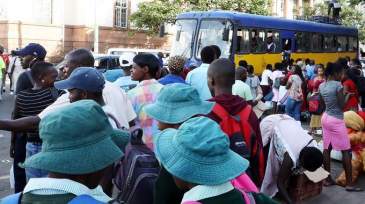The ban on public transport, during the lockdown period, affects people from mining communities living with HIV as well as those with compromised immune systems who require frequent visits to medical centres.
In a statement, the Center for Natural Resource Governance (CNRG) stated that the move by the government poses a challenge to people living with a terminal illness who require frequent visits to the hospital.
President Emmerson Mnangagwa, while declaring the 21-day-lockdown to curb the spread of Coronavirus (COVID19) ordered that all public transport operators cease ferrying people, except for Zupco buses.
CNRG communications officer, Simiso Mlevu, said in Lupane, patients on Anti-Retroviral Treatment in Lupaka area have resorted to sending one representative to Lupaka Health Centre to collect medication for a group of patients in the community.
“UNAIDS classifies people living with HIV and with a compromised immune system as being at a greater risk of COVID-19 infections. In as much as the measure of sending one person to get medication for all patients decongests health centres and minimise the risk of contracting or spreading coronavirus, it reduces interaction between patients and health service providers,” said Mlevu.
“Pregnant mothers from Hwange urban, Lupane rural, and Bikita are also struggling to travel to health centres for ante-natal care. In Arda Transau, where people travel to Mutare General Hospital for medication, there is also limited public transport and as a result, some patients with chronic conditions are defaulting on their medication.
Mlevu called on the government to consider the transportation needs of those seeking non-Covid19 healthcare services or to decentralise the distribution of medication for chronic illnesses and ART to village and ward levels.
She said those on ART can be supplied with medication which can last them for up to 3 months.
Mlevu also noted that when disseminating information about COVID19 to mining communities, the government needs to take cognisance of people living with a disability.
She said sign language for the deaf and braille material for the blind is essential in empowering them with the necessary information about the deadly pandemic.

